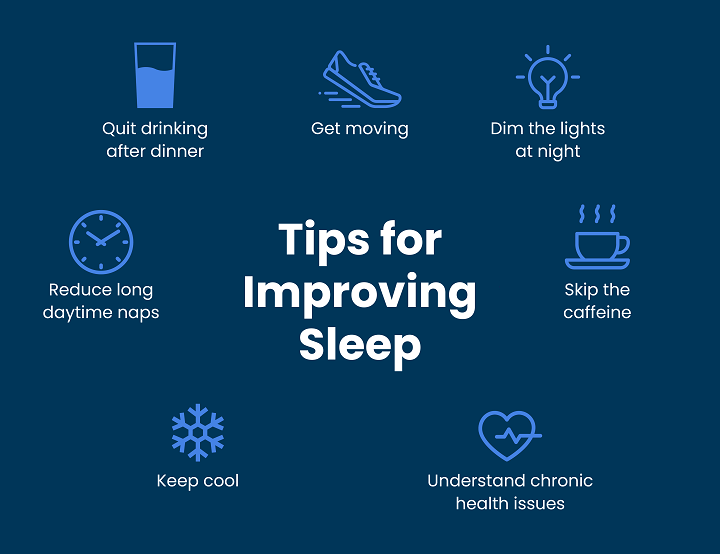Sleep is an essential aspect of our well-being, impacting our physical health, mental clarity, and overall productivity. However, with the demands of modern life, achieving a restful night’s sleep can be challenging for many. Fortunately, there are several practical strategies and lifestyle adjustments that can significantly improve the quality of your sleep. Here are some effective tips for better sleep:
Establish a Consistent Sleep Schedule
- Set a regular sleep routine by going to bed and waking up at the same time every day, even on weekends.
- This helps regulate your body’s internal clock, making it easier to fall asleep and wake up naturally.
Create a Relaxing Bedtime Ritual
- Develop calming bedtime habits, such as reading, taking a warm bath, or practicing relaxation exercises like deep breathing or meditation.
- Engaging in these rituals signals to your body that it’s time to wind down and prepare for sleep.
Ensure a Comfortable Sleep Environment

- Keep your bedroom dark, quiet, and cool. Consider using blackout curtains, earplugs, or a white noise machine to block out disturbances.
- Invest in a comfortable mattress and pillows that support your body and promote restful sleep.
Limit Screen Time Before Bed
- Minimize exposure to screens at least an hour before bedtime. The blue light emitted by devices can disrupt the production of melatonin, a hormone that regulates sleep.
- Instead, opt for relaxing activities like reading a book or listening to calming music.
Watch Your Diet and Hydration
- Avoid heavy meals, caffeine, and excessive fluids close to bedtime as they can interfere with your ability to fall asleep and stay asleep.
- However, a light snack rich in sleep-inducing nutrients like tryptophan, magnesium, or calcium may promote better sleep.
Exercise Regularly
- Engage in regular physical activity, but try to complete your workout at least a few hours before bedtime. Exercise helps regulate your sleep patterns and promotes deeper sleep.
- Yoga, stretching, or light aerobic exercises can be particularly beneficial for improving sleep quality.
Manage Stress and Anxiety
- Practice stress-reducing techniques such as mindfulness, yoga, or progressive muscle relaxation to alleviate anxiety and promote relaxation before bedtime.
- Consider journaling or making a to-do list to declutter your mind and reduce worries that might keep you awake at night.
Consult a Healthcare Professional if Necessary
- If you’re consistently experiencing sleep problems, consulting a healthcare professional or a sleep specialist may be beneficial.
- They can provide guidance, identify potential sleep disorders, and recommend appropriate treatments or therapies.
Quality sleep is crucial for overall health and well-being. By implementing these tips and making small adjustments to your daily routine and sleep environment, you can significantly enhance the quality and duration of your sleep. Prioritizing good sleep habits can lead to improved energy levels, better mood, and enhanced productivity throughout the day. Remember, the path to better sleep often begins with simple yet consistent changes in your lifestyle.

